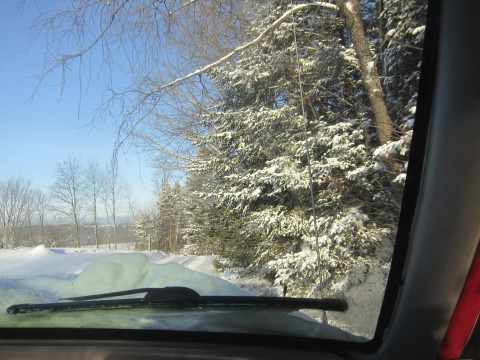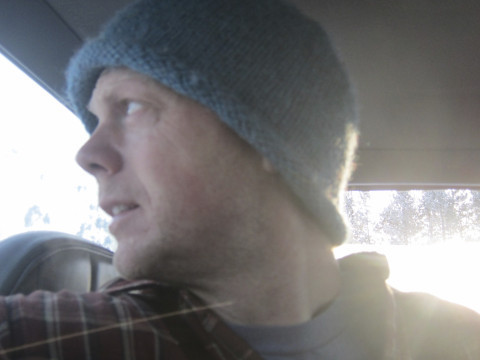More Than Happiness

Snow plowin’ action, morning of 1/29/13. Photos by Fin

In the heat of snowplowin’ battle: Observe the laser-like focus, the steely concentration on the task at hand
Yesterday afternoon at about 3:45, I snuck outside and stepped into my skis. Snow was falling, and it was the best kind, both thick and soft, and moving through it was like moving through one of those half-dreams you have when you’ve woken early and drifted back to sleep. Everything had a muted, insubstantial quality: Every color a shade of gray, every sound absorbed by the thickening layer of snow. Even the ground lacked its usual certainty.
I skied for an hour or so, first down in the woods below the house, and then into Melvin’s upper field. At one point, I skied along a length of barbed wire fence, many times repaired and restrung, dozens if not hundreds of posts representing thousands if not tens of thousands of blows with a maul, never mind the countless hours spent felling and honing lengths of cedar. I am always comforted by evidence of rarely seen and even more rarely heralded labor, which feels to me like a refutation of all the dishonesty that dominates our contemporary economic landscape. Perhaps it is merely my naïveté, but I can’t help viewing such efforts as evidence of a live well lived, a life that is full of the honest contentment inherent to a day’s hard labor, the sight of a fence made straight and true and the muscle-bound memory of that maul being lifted over and over and over.
Of course, I know all too well (having done it) that one can spend a day pounding fence posts, the whole time cursing the rocky soil, the high, hot sun, the blisters swelling and oozing, the damnable cows who will one day find the weakest section and waltz through as if it were nothing more than a whispered suggestion. But the truth is, I think, that even these days matter. Even these days – hard as they may be, interminable as they may seem in their unfurling – are the building blocks of satisfaction. And satisfaction – or contentment, or whatever you want to call it – is the foundation of a good life. Not simple happiness, which is nice and all, but something more complex, something that encompasses a broader range of human experience.
• • •
Regarding my recent posts on money, it occurred to me that I should maybe back up a bit and talk a little about why it felt important to me to explore the issue, rather than bullin’ and jammin’ right into the gritty details (bullin’ and jammin’ being something of a specialty of mine). So, in no particular order, here are some reasons I wrote SAVED in the first place.
1) Money is a defining force in almost everyone’s life, whether they are rich or poor. It defines how we spend the majority of our waking hours, and it often defines where we live, and therefore, whom we associate with. Who we call our friends. In many cases, whom we choose for a life partner. A high percentage of our day-to-day interactions involve money. And yet, how many people truly understand where it comes from? What it represents? Why it works (or doesn’t work) the way it does? The juxtaposition between money’s impact on our lives and our societal lack of understand regarding its mechanics is fascinating to me.
2) I am simply curious about my own relationship to money and how it impacts my life.
3) Just as I wanted to better understand the mechanics of money, I wanted to better understand the mechanics of my friend Erik’s life, Erik being the fellow who lives quite happily on $6k annually. How does such a life actually work? And why would he choose such a life in the first place? Part of what made Erik’s story so compelling is his obvious contentment and the richness and depth of his community, along with the tremendous beauty in his life. Do these things correlate to his monetary poverty? If so, are they the result of his relationship to money, or has his relationship to money evolved out of these factors?
4) Is it possible that the accumulation of money actually weakens our connection to others and to the natural world? If so, how and why?
5) What is money? I mean we all know that even a one hundred dollar bill is useless without the societal agreement that it’s actually worth something. So is it possible that money isn’t even really a thing, but an agreement?
6) How might what I learn about money and from Erik define the balance I strike in my own life between the accumulation of money as a safety net for an unknown future, and my increasing awareness that how I spend my time is how I spend my life? In other words, what am I actually trading for the “security” of accumulated monetary wealth?
And with that, I will shut up about money for a while and return to my regular habit of revealing the deepest secrets of the universe. Thank you for reading.

Ben Hewitt's Blog
- Ben Hewitt's profile
- 37 followers



